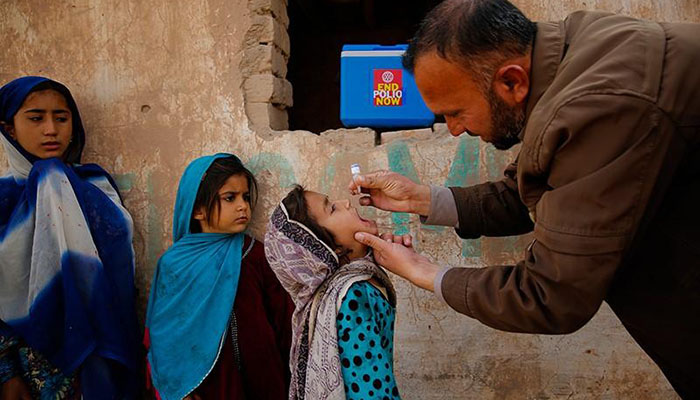IMB says if drastic measures not adopted then polio could be worse in six months
Report says Pakistan is at risk of wild poliovirus cases reaching 500 by end of 2020 and vaccine-derived poliovirus cases reaching 1,000
The Independent Monitoring Board (IMB) in its latest assessment of the global polio eradication programme warned that if Pakistan does not adopt transformative measures to eradicate poliovirus from the country in the next six months, the situation could become dire.
The 18th report of the IMB, which comprises global experts, is hopeful that Pakistan still has a chance to root out the crippling disease. “There is a new impetus for change and for rapid progress to be made,” it highlights.
“If that does not happen in the next six months, if those changes do not get rolling, the wheels will come off the Pakistan bus.”
Citing modelling data, the report notes that Pakistan is at the risk of wild poliovirus cases reaching 500 by the end of 2020 and vaccine-derived poliovirus cases reaching 1,000.
“Unless renewed, well-planned and sustained polio vaccination is resumed for the remainder of 2020, the consequences of the inevitable large outbreaks of both kinds of poliovirus will be dire for Pakistan, Afghanistan and probably other countries as well,” it adds.
The situation is “extremely worrying” as the outbreak of the poliovirus spreads to previously polio-free areas in the country.
Before the release of the independent assessment report, the IMB team was briefed by Dr Zafar Mirza, the former special assistant to the prime minister for Health.
He was accompanied by the National Emergency Operations Centre Coordinator and a representative of the Pakistan Army.
The report notes that Dr Mirza left his post “unexpectedly” while the report was being compiled. “There was no inkling of it when he attended the IMB meeting.”
At the moment, there is no focal person to the prime minister for polio eradication, after the departure of Babar bin Atta in October.
“The current duality of Minister and Head of the National Emergency Operations Centre has replaced the previous, three-person team that included a Prime Minister’s Focal Person for Polio Eradication,” the report observes, “The IMB expressed its concern to the then Minister [Dr Zafar Mirza] that his heavy personal workload…inevitably meant that his time for polio would be under severe pressure.”
Another setback to the program, notes the report comes from the absence of political unity.
At the November 2019 meeting, Dr Mirza had announced that he would bring all political parties and interests together for regular meetings at the national level.
However, later the doctor told the Board that no formal meeting of this kind had yet taken place by explaining that there had been a change in his approach to engaging with the political leadership. Instead of having big meetings, he was working with them at a more personal level ‘behind the scenes’, the report states. “This sends a confusing message about the government’s ability and determination to create an unambiguous and non-partisan commitment to everything necessary for success in polio eradication.”
-
Can brain stimulation make people kinder & less selfish? New study offers hope
-
Mariah Carey details 'hardest' bipolar disorder experience
-
Pink reveals health routine for asthma management
-
Gigi Hadid talks about 'relieving tension' amid having Hashimoto's disease
-
Selena Gomez explains why she thought lupus was 'life-or-death'
-
How Kim Kardashian made her psoriasis ‘almost’ disappear
-
Nick Jonas gets candid about his type 1 diabetes diagnosis
-
Sir Jackie Stewart’s son advocates for dementia patients












